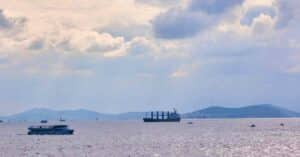
Hezbollah Leader Criticizes US-UK Strikes, Warns Of Maritime Security Threat
January 15, 2024
Container Shipping Rates Reach Record High Due To Red Sea Disruption
January 15, 2024
The international shipping industry has been warned to temporarily avoid the vital maritime trade route that connects Asia and Europe in response to the US and UK bombardment of Houthi targets in Yemen. The Combined Maritime Forces, which includes 39 nations, warned all ships to “stay well away” from the Bab el-Mandeb, according to an alert from INTERTANKO, a trade association representing owners of oil, chemical, and gas tankers. This warning comes after the US and UK carried out more than 60 airstrikes on Houthi targets in Yemen, intending to halt Iran-backed attacks in the southern Red Sea.
The advice has significant implications for merchant ships as the Bab el-Mandeb is an essential gateway for marine traffic. Chief maritime analyst at BIMCO, Niels Rasmussen, affirmed that military instruction is to avoid areas of hostility, blocking transit across the southern Red Sea. Rasmussen states that If the situation gets out of hand, all vessels will be expected to avoid the Red Sea until safe passage is reestablished, except those that might not be travelling through the Red Sea entirely.

The shipping industry has been advised to remain cautious due to the recent bombings, even though Houthi attacks on vessels have mainly targeted container ships transporting manufactured products. Even before the strikes, Trafigura Group projected a 15%-20 % drop in the flow of gas and oil tankers. According to digital vessel tracking data, numerous tankers carrying chemicals and oil goods changed their itineraries during the attacks. While some ships carried on via the Bab el-Mandeb, most oil tankers’ owners decided to stop their transits in the region.
Although merchant shipping maintains the freedom of movement, enabling ships to pass through lawfully, it is still being determined how these transits are covered by insurance. Rigorous adherence to the advice might lead to the Bab el-Mandeb blockage, effectively closing off the Suez Canal as an alternative for vessels sailing between Europe and Asia. According to BIMCO’s Rasmussen, there would be a 12%, 11%, and 5% rise in need for tanker, container, and dry bulk shipping, respectively, in the case of a protracted closure in the Red Sea.
NATO, European governments, regional countries, and other countries are part of the CMF, a multinational maritime alliance led by the United governments. The note was delivered to INTERTANKO’s members, who collectively represent most of the world’s independent tanker fleet, and it underlined that it would take several days before the threat to shipping disappeared.
Reference: Reuters, BNN Bloomberg
“Stay Well Away” Combined Maritime Forces Warn Vessels To Avoid Bab El-Mandeb Strait appeared first on Marine Insight – The Maritime Industry Guide
Source: Maritime Shipping News


